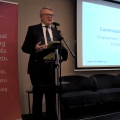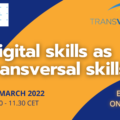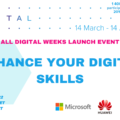08 Apr ALL DIGITAL highlights the role of non-formal training providers in equipping young people with digital skills for employability
08 Apr, 2018
On 5 April, Gabriela Ruseva, ALL DIGITAL Policy Officer, delivered a presentation at the international symposium on “Digital Skills for Everyone: Accelerating Europe’s Competitiveness and Inclusive Growth”, explaining the role of the non-formal training sector and giving some successful examples from our network.
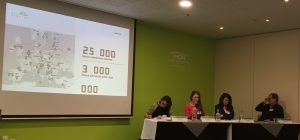 The symposium was a great opportunity to exchange with other experts from academia, public authorities, foundations and the private sector, ideas related to attracting girls to STEM, recognising skills acquired through non-formal training, and finding allies to change old-fashioned approaches to training.
The symposium was a great opportunity to exchange with other experts from academia, public authorities, foundations and the private sector, ideas related to attracting girls to STEM, recognising skills acquired through non-formal training, and finding allies to change old-fashioned approaches to training.
All participants agreed on the immediate need to find more efficient ways, because digital skills are no longer a luxury, but a necessity in a labour market where 90% of jobs will require them at least at basic level.
Currently formal education is focusing mainly on ICT literacy as in teaching students how to use a word-processing software, how to work a spreadsheet and how to surf the Internet. But nowadays there is an ever-growing need to go beyond the technical skills and to teach people how to learn, how to solve a problem with digital technologies, how to code, how to create a programme or a digital story, how a computer works and how to make it work for them! Our main challenge is to empower digitally savvy consumers to become digitally savvy prosumers.
A prosumer is not only consuming but also creating media. And this cannot happen out of a context. ALL DIGITAL are analysing how different groups develop different skills using the computer. Often, low-skilled people use the computer, the tablet or the smartphone only as consumers and mainly for entertainment purposes (e.g. to play a game), while high-skilled people tend to use them as prosumers, as tools to learn and educate themselves. We think it is important for low skilled people to start using the computer as a tool to work together to find solutions, resolve problems and create a digital product (a game, a digital story, a video, etc.)
Gabriela underlined the importance of raising awareness and demystifying digital technologies, for example through campaigns such as the ALL DIGITAL week. I’m not good with technology cannot be an excuse anymore. Many new opportunities are only a click away, if only we knew about them.
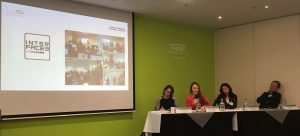 Then, she went on to present successful practices from our members such as the approach of Interface3, a training centre working with disadvantaged unemployed women in Brussels. Annually 130 young women follow an IT training which leads to a qualification. 100 (72%!) out of them find a job and a new career path after the training. 38 different nationalities in 2016 and most of the women were from a migrant background. They feel secure, are not intimidated by technology, taught by other women and empowered by a training that is responsive to their interests and background, including drama and language classes, performances, etc.
Then, she went on to present successful practices from our members such as the approach of Interface3, a training centre working with disadvantaged unemployed women in Brussels. Annually 130 young women follow an IT training which leads to a qualification. 100 (72%!) out of them find a job and a new career path after the training. 38 different nationalities in 2016 and most of the women were from a migrant background. They feel secure, are not intimidated by technology, taught by other women and empowered by a training that is responsive to their interests and background, including drama and language classes, performances, etc.
Another example presented was Capital Digital, a coding course for young people in disadvantaged areas of Brussels powered by our other member MAKS vzw. Capital Digital trains 15-18 years old youngsters form disadvantaged backgrounds, migrants and asylum seekers on how to teach coding and programming to their younger 10-12 years old peers in neighbourhoods with a low socio-economic status. The young “e-facilitators” learn how to engage children in coding activities in a playful way. This peer-learning pedagogical method showed to be very effective in fostering the STEM education and the inclusion of disadvantaged students both inside and outside the classroom.


